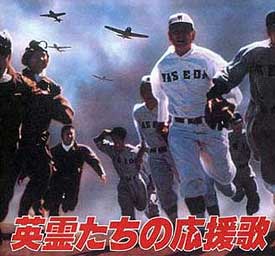 In 1979 I went to a special showing of Kihachi Okamoto's The Last Game (Eireitachi no oenka: saigo no sokeisen, 1979) in Seattle. It's Japanese title translates something like "Rousing Song of the Spirits of the War Dead: Last Game of Baseball." It's based on a book by Keisuke Kamiyama & was a combination war story & sentimental baseball movie. In 1979 I went to a special showing of Kihachi Okamoto's The Last Game (Eireitachi no oenka: saigo no sokeisen, 1979) in Seattle. It's Japanese title translates something like "Rousing Song of the Spirits of the War Dead: Last Game of Baseball." It's based on a book by Keisuke Kamiyama & was a combination war story & sentimental baseball movie.
It showed the difficulties Japanese baseball players had when drafted out of their universities & sent into the Pacific War. Shingo ( Toshiyuki Nagashima) & his buddies surreptitiously attempt to keep up their baseball skills, for a day when they will no longer be looked at as some kind of traitors for loving a sport from America. When caught playing the game they loved, they convinced their commander they were practicing throwing grenades.
The audience who turned out included a lot of people who would rather have seen something on the order of Okamoto's Sword of Doom (Daibosatsu toga, 1966), but in fact the baseball film was more memorable than any of us may have been expecting. Kihachi Okamoto had come to Seattle for the premiere & afterward was interviewed by a translator who spoke with such a perfect western accent he could've passed for Japanese American if only he could stop using the word "Engrish."
Taking questions from those of us who were so happy to meet him, Okamoto was in a great mood, being wined & dined by Americans who knew several of his films. At one point he said he tries to make the best films possible because "When you are Number 2, you try harder."
At a time when both Koyahashi & Kurosawa lived, considering himself the Number 2 Japanese director was rather an exaggeration, but fact is, if most of his films had been the equal of Sword of Doom, he might've been about half justified in thinking of himself as second to Kurosawa. But Okamoto's next-best film is such a distant second place that it appears as though he made only one great film during his life.
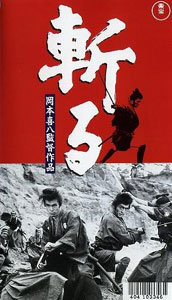 A candidate for his second-best is Kill! (Kiru, 1969). Visually this film's a stunner for wide screen black & white dusty windswept run-down village images. A candidate for his second-best is Kill! (Kiru, 1969). Visually this film's a stunner for wide screen black & white dusty windswept run-down village images.
Comparing it to Sword of Doom is perhaps unfair to Kill! but with Tatsuya Nakadai starring in both stories, it's hard not to notice that even this great actor is not at the top of his game. He created a character of eternal menace in Sword of Doom, of eternal heroism in Harakiri (1964), of tragic dutifulness in Samurai Rebellion (1967), but in Kill! he is merely very good at being a stock character.
With a soundtrack that occasionally evokes old American westerns (of which Okamoto was himself a great fan), & a jaunty smart-aleck attitude for the entire script, it's impossible to take this as anything but a satire, yet at the same time some of the deaths are too tragic for any of it to succeed as comedy.
Nevertheless many chambara (swordplay cinema) fans who've seen enough samurai films to recognize the plethora of character-type parodies do often find it all very amusing.
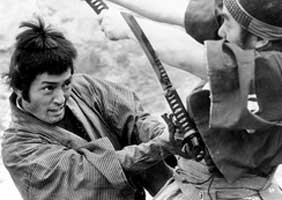 Nakadai plays an ex-samurai who lives as a wandering yakuza & has fallen into the penury of a tramp, remaining in good spirits about his fallen condition which he seems to like better than his "successful" past that had required him in obedience to a lord to kill his own best friend. Nakadai plays an ex-samurai who lives as a wandering yakuza & has fallen into the penury of a tramp, remaining in good spirits about his fallen condition which he seems to like better than his "successful" past that had required him in obedience to a lord to kill his own best friend.
This occurred three years before the opening of the present tale, so it has been some while since he gave up his samurai position rejecting the cruelty of his class. Now, in this grimy village, he recognizes circumstances similar to those he experienced when still a vassal.
Another tramp is an ex-farmer (Etsushi Takahashi) who sold his riceland to buy a pair of swords & hopes to become a samurai. He has ditched his peasant name of Haji in favor of Hanjiro Tabata, in contrast to the ex-samurai who traded his name Hyodo Yagenta for a wanderer's name, Genta.
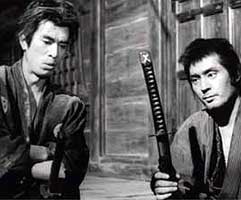 Hanjiro wanders into the crummy little village the same time as Genta the samurai-cum-yakuza. Genta will try to convince him repeatedly that "samurai are bad." But a farmer with big dreams won't easily change his intentions. Hanjiro wanders into the crummy little village the same time as Genta the samurai-cum-yakuza. Genta will try to convince him repeatedly that "samurai are bad." But a farmer with big dreams won't easily change his intentions.
Although he's not exactly a skilled swordsman, he is so immensely strong that he can bamboozle his way very successfully through any battle, & it's never out of the question that his dream of crossing from farmer class to samurai class could come true.
The only question is how long will it take him to realize Genta is right & his dream is not providing Hanjiro a path of happiness.
The plot heaps betrayals atop betrayals as a group of well-meaning young samurai pull off an assassination for the sake of the clan, but then the clan minister arranges to have the cluster of assassins killed by a group of desparately impoverished ronin (including our ex-farmer Hanjiro).
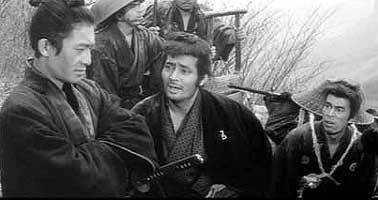 Plus the clan minister has hidden gunners in the hills to shoot down whoever might be left standing after the battle between ronin & naive young vassals. Plus the clan minister has hidden gunners in the hills to shoot down whoever might be left standing after the battle between ronin & naive young vassals.
This is intentional silly overkill, a set-up not intended to tell a good story but to permit lots & lots of horrific swordplay & slaughter.
Meanwhile our ex-samurai yakuza has taken up his swords again to be a samurai & try to save the betrayed samurai & the group of ronin. Along the way he is assisted by a jolly government official (Eijiro Tono) who has never until now set foot in a brothel & is so happy to be taken to one that he instantly sides with whatever Genta & Hanjiro want.
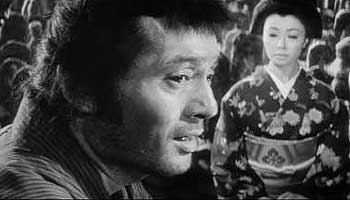 This is based on the same Shugoro Yamamoto story that was the inspiration for Akira Kurosawa's Yojimbo (1961), another comparison that Kill! cannot easily stand up to. This is based on the same Shugoro Yamamoto story that was the inspiration for Akira Kurosawa's Yojimbo (1961), another comparison that Kill! cannot easily stand up to.
On the surface Kill! comes off as a bad imitation of the truly brilliant & genuinely comic Yojimbo. But in fact the adaptations barely resemble one another beyond the post-town setting.
Kurosawa can never resist enobling samurai as in the case of the nameless ronin played by Toshiro Mifune, whereas Okamoto's version has very little respect for the military class & would just about qualify as an anti-samurai film.
It's even so fun to watch Nakadai perform, no matter what he's in. Additionally the swordplay action in Kill! is brutal so no action fan can be disappointed.
Most of the all-out-comedy sequences fail (like hungrily crawling around after a sickly chicken), but other elements, like the love story between our would-be samurai ex-farmer & a prostitute (Yuriko Hoshi) who "smells of the earth," are simultaneously moving & very funny. The film has more in its favor than against it, but it was nevertheless not the most attention-holding samurai film (or anti-samurai film).
copyright © by Paghat the Ratgirl
|
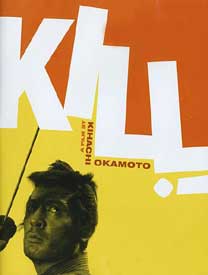


 Nakadai plays an ex-samurai who lives as a wandering yakuza & has fallen into the penury of a tramp, remaining in good spirits about his fallen condition which he seems to like better than his "successful" past that had required him in obedience to a lord to kill his own best friend.
Nakadai plays an ex-samurai who lives as a wandering yakuza & has fallen into the penury of a tramp, remaining in good spirits about his fallen condition which he seems to like better than his "successful" past that had required him in obedience to a lord to kill his own best friend.
 Plus the clan minister has hidden gunners in the hills to shoot down whoever might be left standing after the battle between ronin & naive young vassals.
Plus the clan minister has hidden gunners in the hills to shoot down whoever might be left standing after the battle between ronin & naive young vassals.